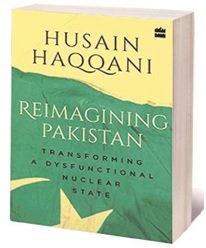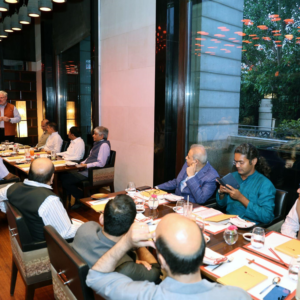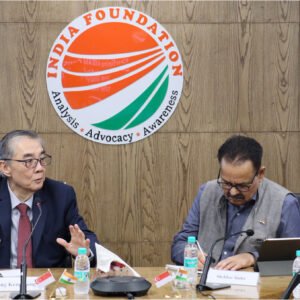Author: Husain Haqqani
Publisher: Harper Collins India, 2018, pp. 336
Price: Rs.699/-
Book Review by:Alok Bansal*
Pakistan has emerged as the epicentre of global terror, which is the result of an extremely radicalised society. The process of radicalisation continues unhindered, as Pakistan’s successive leaders have chosen to define its nationalism in terms of religion. Many believe that the radicalisation in Pakistan is nothing but the result of General Zia-ul-Haq’s rule of more than a decade. They probably tend to forget that Pakistan’s leadership right from the beginning delved into religious symbolism. Even Mohammad Ali Jinnah, who is today perceived as a paragon of secularism, made numerous statements with religious connotations. His whole argument for Pakistan was based on the dissonance between Hindus and Muslims. Consequently, Pakistan and Islam became synonymous. Having been created on the basis of religion, Islam automatically assumed salience in the new state and thereafter radicalisation was a natural progression. This process was only accelerated by Zia, however, subsequent attempts at checking the onslaught of radicalisation have floundered, because no subsequent leader has been willing to change the narrative completely.
Husain Haqqani, in his current book analyses Pakistan’s problem in light of its identity crisis and recommends reconfiguring Pakistan’s identity away from Islamic symbolism of the past. Haqqani, a former journalist and diplomat, who was Pakistan’s envoy to Sri Lanka and the United States, has traversed the entire political spectrum of Pakistan. He began his political career from the student wing of Jamaat-e-Islami, thereafter he hitched his band wagon to General Zia and after his death to that of his protégé Nawaz Sharif, who appointed him as Pakistan’s High Commissioner to Sri Lanka. He switched allegiance to Pakistan Peoples Party (PPP) after Nawaz’s fall, which finally appointed him as the Ambassador to the US, where he was accused in ‘Memogate’ of having conspired against Pakistan’s powerful Army, and forced to resign. He was recalled to Pakistan and accused of ‘High Treason’. He was permitted to go abroad for medical treatment. A judicial commission appointed by the Supreme Court has subsequently found him guilty of undermining the country’s security and reported that he “was not loyal to Pakistan”. Haqqani has since refused to return to Pakistan citing threats to his life.
Considering his chequered history, certain bias against the state is inevitable, at the same time his unique exposure to Jamaat and its youth wing, makes him eminently suitable to analyse the radical mind-set. He therefore is uniquely positioned to analyse the flaws in the path undertaken by Pakistan’s leaders. The book clearly highlights that right from inception Pakistan’s leaders tried to superimpose an Islamic identity to tide over its ethnic differences, without realising that Islam had never been a monolith ever since prophet’s death and it could lead to sectarian and doctrinaire differences.
The book begins with highlighting how Pakistanis suffer from a sense of persecution and believe that the world is conspiring against their country, whereas the global community perceives it as a ‘migraine’ that is not going away. It then deals with the history and how Islam got intertwined with the demand for a new state for Muslims of India. It provides valuable insights into various theories propounded by the Muslim League and its supporters to justify their demand for a separate homeland and their absurdities. The fact that only about 15 per cent of population was entitled to vote in the 1945-46 elections, debunks the Muslim League’s claim to represent the Muslim masses. It also clearly brings that while demanding Pakistan, the Muslim League, clearly had no plan of how to administer it. Jinnah’s statement that he was ‘going to Pakistan as a citizen of Hindustan’ showed complete ambiguity about the future of Pakistan. Author contends that ‘Pakistan was “insufficiently imagined”, considering the ambiguities inherent in the demand for Pakistan.’
It then goes on to cover ‘Ideological Dysfunction’ and ‘Islamist Rage’, which highlight the growing radicalisation of Pakistani society as well as the state’s inaction in dealing with the menace. Numerous incidents of religious violence have been covered and analysed to show that right from the beginning Pakistan’s leaders including Jinnah, gave a free hand to clerics in order to mobilise masses for his cause. Anybody opposing the Muslim League was branded as infidel by clerics carrying Quran and this has probably contributed to liberal accusations of blasphemy today. According to the author, most of Pakistan’s current problems have their genesis in defining Pakistani nationalism in terms of Islam and Islamic identity.
The author gives out the jihadi narrative in ‘Insecurity and Jihad’, and explains how Pakistan’s rulers tried to use it to further their perceived national interests. He highlights the concept of ‘Ghazwa-e-Hind’ and analyses the differences between al-Qaeda and ISIS in their understanding of Hind. One of the biggest of failures of Pakistan has been its inability to build credible institutions during last seven decades, barring one, the Army. The Army dominates every aspect of Pakistani State, so much so that it is often said that in Pakistan’s case it is often an army, which has got a state, unlike the other way around. The army has assigned to itself the role of not only guarding the physical frontiers of the state, but also its ideological frontiers, which gives it right to interfere in any aspect of state’s functioning. ‘The Institution’ and its interference in the political sphere has prevented Pakistan from behaving like any normal nation state and has been forced to act like a security state, where almost every aspect of the state’s functioning is controlled by the security agencies. This overemphasis on security has ensured that most Pakistanis want to become ‘Warriors, not Traders’. Consequently, despite liberal international aid, Pakistan’s economy continues to be in doldrums.
Finally, the author gives his recommendations to Pakistan for ‘Avoiding the March of Folly’, which still bases its narrative on the ‘Two Nation Theory’ and believes in irrevocable hostility towards ‘Hindus and other enemies of Islam’. According to the author Pakistan faces five critical faultlines and it’s inability to offer suitable policy responses to them is the genesis of ‘Pakistan’s Predicament’. The author contends that two pillars of Pakistani nationalism, namely, Islam and anti-Indianism are both ambiguous and problematic. The author prophesises that if Pakistan does not sufficiently ‘grow economically, integrate globally and remains mired in ideological debates’ its future is not going to be different from its past.
The book makes an excellent reading and is a must for anybody wanting to understand Pakistan’s ideological quagmire. Unfortunately, because of his past, his sane advice and wise counsel, is not likely to be given due importance in Pakistan, where people are bound to see it with a jaundiced eye. The book is bound to be appreciated by serious academics across the globe, although there are some minor errors like sectarian affiliation of Khwaja Nazimuddin, the second Governor General and Prime Minister of Pakistan. It offers any student of Pakistan some rare insights; coming from someone, who has been part of the government, these are extremely valuable.
*Capt. Alok Bansal is a Director of India Foundation.
(This article is carried in the print edition of July-August 2018 issue of India Foundation Journal.)




